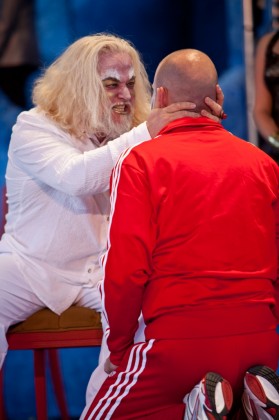REVIEW: Julius Caesar an old story full of surprises
 In the program for Julius Caesar, now playing at the Freewill Shakespeare Festival in Hawrelak Park, director John Kirkpatrick is quoted, “I have decided to set the play in a world/time period of my own imagination…”
In the program for Julius Caesar, now playing at the Freewill Shakespeare Festival in Hawrelak Park, director John Kirkpatrick is quoted, “I have decided to set the play in a world/time period of my own imagination…”
It’s a pragmatic and serviceable idea given William Shakespeare’s constant – and anachronistic – references to “clocks,” something which was invented a good millennium after Julius Caesar’s murder at the hands of some of his most trusted acquaintances. Given the play’s constant and timeless themes of power, ambition, corruption and guilt, this play could have just as easily set in Stephen Harper’s scandal-plagued Parliament.
Julius Caesar is not only one of The Bard’s most produced plays, but also one of the most quotable. Many of us have heard most of the lines in a myriad of contexts, many away from the stage. Hands up all of those who were not force-fed this play in high school. For those few not familiar with the story, Julius Caesar – General of the Roman Imperial Army – has just returned, triumphant in the war against Pompei, bringing with him plundered riches and a new wave of slaves. And just how does the Roman Senate plan to reward the conquering hero? In a plot straight out of a Dilbert comic strip, Caesar’s bonus for a job well done comes with knives plunged into his back. Ancient Rome’s work incentive plan: Work hard and we’ll kill you.
Cassius explains to Brutus that this is necessary because Caesar is – in the parlance of yore – becoming a little too big for his britches. It’s a hard sell because Brutus is very loyal to Caesar. However, Brutus is more loyal to Rome. The assassins might have gotten clean away with their deed. But Brutus – trusting schmuck that he is – allows Marc Antony to speak at Caesar’s funeral and Antony’s eulogy turns Rome against the conspirators. And – in the parlance of today – it is on. Needless to say, it doesn’t end well. The ruling classes of the day liked it when Shakespeare’s historical tragedies ended with stinging and lethal retribution for those who would usurp the throne. In fact, one of the conditions of King James I commissioning of Macbeth is that Shakespeare end the play with Macbeth’s violent demise at the hands of Macduff for killing the King and squatting on the throne, completely ignoring the historical fact that Macbeth died of natural causes after ruling Scotland for 17 years.
Even though you might be familiar with the plot, this particular production of Julius Caesar is worth seeing for its many surprises – the biggest of which is the seeming ease that Kevin Corey’s Cassius is able to steal scenes from Chris Bullough’s Brutus. No easy task, given just how good an actor Bullough is.
Getting back to Kirkpatrick’s direction and aesthetic choices, he ditches the expected togas and laurel wreaths for goth makeup and paramilitary chic, decisions that work well in the context of the setting from his own mind. He also gives it a blocking and pace that gives the play an excitement and vitality even though most of us know what’s going to happen next. The ominous tone is well supported by Dave Clarke’s ferocious horror movie score, with Clarke knowing full well that happy, major key tones would not have served this production at all. His score also softens the most strident utterances of some of the minor players. And when was the last time you heard a mellotron used for a play’s soundscape? Or see the final tableaux come with a visual scope that’s straight out of a Kurosawa film?
Again, it’s just a couple of the many pleasant surprises in this imaginative version of Julius Caesar.
Julius Caesar runs on even numbered dates at the Hawrelak Park’s Heritage Amphitheatre; The Tempest runs odd dates and matinees.











